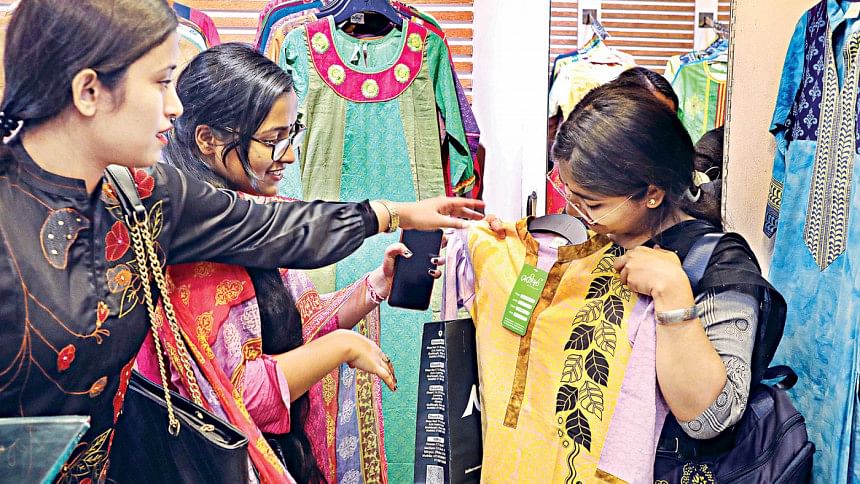Pahela Baishakh sales make a comeback

Sales centring Pahela Baishakh have picked up as people from all walks of life, buoyed by the improvement in the coronavirus situation, are set to welcome the Bangla New Year in colour and festivity today.
The celebration to mark Pahela Baishakh, the biggest cultural festival in Bangladesh, was muted in the last two years owing to the crisis and related lockdowns. As a result, demand during the second-largest sales season after Eid-ul-Fitr had plummeted.
But the drastic fall in coronavirus caseloads and no death related to the virus in recent weeks mean people are in a joyous mood to celebrate the occasion, in a cheer for clothing and lifestyle brands, sweet retailers, and Hilsa traders.
Traders in markets and shopping malls in the capital city yesterday said they have been passing a busy time to handle the rush of shoppers for the last few weeks.
"Pahela Baishakh is getting a whole new look after a two-year lull. We are getting good response from buyers," said Mohammad Ashraful Alam, chief operating officer of Aarong, which has about two dozen outlets.
Khalid Mahmood Khan, director of Kay Kraft, another fashion brand, says sales are going fairly well.
"As Pahela Baishakh has fallen in the month of Ramadan, people will celebrate it in a moderate manner. Some customers may cut the budget since Baishakh and Eid-ul-Fitr will be celebrated around the same time. So, we have taken preparations keeping the two festivals in mind."
Khan says the people whose income has not been affected by the pandemic or higher inflation are buying Baishakh-related clothing and other items.
SaRa Lifestyle Ltd, a sister concern of Snowtex Group, a garment exporter, recorded about Tk 50 lakh in Baishakh and Eid-related sales on Tuesday.
"The sales target was not attained in the last two years. As we are getting good responses from customers this year, we may attain our target," said Sharifunnesa Reba, director of the company, which owns eight outlets.
The Covid-19 situation has improved a lot, so there is no fear among people. "So, they can go shopping without any apprehension," she said.
A salesman at an outlet of Yellow, a clothing retailer owned by Beximco, at the Bashundhara City Shopping Complex, says sales have picked up.
The biggest garment wholesale market in Keraniganj, known as Poshakpalli, has recorded increased sales as well.
Hassan Mia, a wholesaler, made 30,000 pieces of panjabi, all of which were sold before the start of Ramadan.
"New demands are coming. But we don't have the capacity to supply them on time," he said.
As people will celebrate the Bangla New Year during the fasting month, it is a bit difficult to separate the exact volume of Baishakh-centric sales from those linked to Eid-ul-Fitr.
According to a survey of the Bangladesh Fashion Entrepreneurs Association, a platform of fashion organisations, conducted in 2012, fashion houses across the country sell around Tk 6,000 crore throughout the year.
More than 50 per cent of them are sold during Eid-ul-Fitr and at least 25 per cent are in the month of Baishakh.
Sweets are an integral part of the Baishakh celebration and items worth around Tk 50 crore were sold all over Bangladesh during Baishakh before the pandemic arrived.
Sweet shops did not record significant sales during Baishakh in the last two years as the contagious virus kept the consumers at bay. Despite the petering out of the pandemic, the situation has not improved much.
"If we compare this year's business ahead of Baishakh with 2019, it is 10-15 per cent," said Mahbubur Rahman Bakul, head of corporate affairs of Premium Sweets.
Last evening, Mohammad Sujon, a senior salesman of Premier Sweets outlet in Karwan Bazar, however, said the sales were 70 per cent of the 2019 level.
People usually welcome Baishakh in the morning of the day eating Hilsa with watered rice, whether at home, in restaurants or in public places. But due to the fasting month, there will be no such arrangement this time, which has driven down the sales of the most popular fish in the country.
Still, the price of the fish is quite high.
Traders at the capital's Karwan Bazar kitchen market sold a Hilsa fish weighing one kilogramme at Tk 1,400-1,600 yesterday. It was Tk 900-1,200 for the fish weighing 800 grammes.
"I have sold half the amount of fish I had sold at this time in 2019. The demand is low," said Mollah Nasir Uddin, a fish trader.
Babul Aktar, president of the Bangladesh Frozen Food Exporters Association, said traders did not stock up the fish this year since there were no celebrations in the last two years.
"Importers have not imported the fish from Myanmar because of the losses they incurred last year and as the festival will be celebrated during Ramadan."
Khondaker Golam Moazzem, research director of the Centre for Policy Dialogue, said businesses going well ahead of Baishakh is a sign of economic recovery.
"Many are participating within their limited means," he said, referring to the pressures people are facing owing to higher inflation.


 For all latest news, follow The Daily Star's Google News channel.
For all latest news, follow The Daily Star's Google News channel. 



Comments